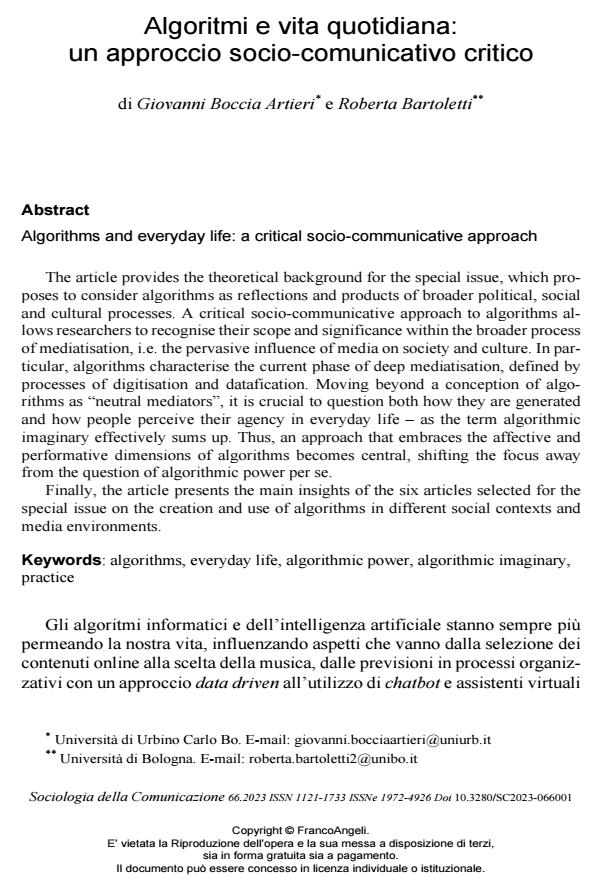Algorithms and everyday life: a critical socio-communicative approach
Journal title SOCIOLOGIA DELLA COMUNICAZIONE
Author/s Giovanni Boccia Artieri, Roberta Bartoletti
Publishing Year 2024 Issue 2023/66
Language Italian Pages 16 P. 5-20 File size 250 KB
DOI 10.3280/SC2023-066001
DOI is like a bar code for intellectual property: to have more infomation
click here
Below, you can see the article first page
If you want to buy this article in PDF format, you can do it, following the instructions to buy download credits

FrancoAngeli is member of Publishers International Linking Association, Inc (PILA), a not-for-profit association which run the CrossRef service enabling links to and from online scholarly content.
The article provides the theoretical background for the special issue, which proposes to consider algorithms as reflections and products of broader political, social and cultural processes. A critical socio-communicative approach to algorithms allows researchers to recognise their scope and significance within the broader process of mediatisation, i.e. the pervasive influence of media on society and culture. In particular, algorithms characterise the current phase of deep mediatisation, defined by processes of digitisation and datafication. Moving beyond a conception of algorithms as “neutral mediators”, it is crucial to question both how they are generated and how people perceive their agency in everyday life – as the term algorithmic imaginary effectively sums up. Thus, an approach that embraces the affective and performative dimensions of algorithms becomes central, shifting the focus away from the question of algorithmic power per se. Finally, the article presents the main insights of the six articles selected for the special issue on the creation and use of algorithms in different social contexts and media environments.
Keywords: algorithms, everyday life, algorithmic power, algorithmic imaginary, practice
- La piattaformizzazione del piacere: vendere sex toys nell'era digitale tra influenze femministe e strategie di social media marketing Chiara Gius, Claudia Capelli, in SOCIOLOGIA DELLA COMUNICAZIONE 68/2025 pp.102
DOI: 10.3280/SC2024-068008 - Specchio riflesso! Un'esperienza etnografica con TikTok Elisabetta Zurovac, in SOCIOLOGIA DELLA COMUNICAZIONE 68/2025 pp.83
DOI: 10.3280/SC2024-068007 - Violenza di genere e tecnologie: ripensare le disuguaglianze nell'era digitale Chiara Gius, Antonella Mascio, in SOCIOLOGIA DELLA COMUNICAZIONE 70/2026 pp.5
DOI: 10.3280/SC2025-070001 - Datacasting. L'esperienza del flusso algoritmico nell'ecosistema delle streaming platform e in TikTok Alberto Marinelli, Ellenrose Firth, in SOCIOLOGIA DELLA COMUNICAZIONE 67/2025 pp.20
DOI: 10.3280/SC2024-067002
Giovanni Boccia Artieri, Roberta Bartoletti, Algoritmi e vita quotidiana: un approccio socio-comunicativo critico in "SOCIOLOGIA DELLA COMUNICAZIONE " 66/2023, pp 5-20, DOI: 10.3280/SC2023-066001